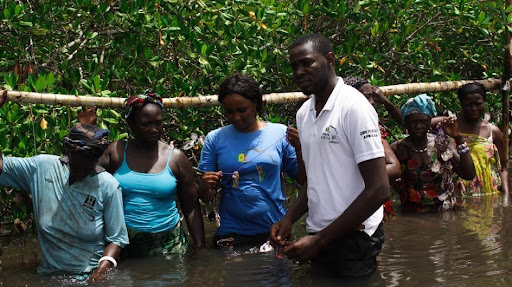
Nema Bah is a village of about 1500 inhabitants divided into 148 households, with young people representing 50% of the mostly female population. There is only one elementary school in the village, as well as
a health post where one can see a midwife to assist in birthing procedures. Politically, the village has municipal councilors who represent the town hall of Toubacouta at the site level. Women work principally in the harvest of oysters, which is done in non-winter periods. During the cold season, the women stop harvesting to let the oysters regenerate and preserve the ecosystem while continuing to market their products.
This project was chosen through design thinking by the women’s association of Nema Bah. Oysters are an important part of the community, which many use to build their homes by transforming empty shells into cement. The women’s organization provides these shells for construction and sells oysters to earn an income. The women do not currently have a storage room for their oysters and are forced to leave them on the beach without any protection. This causes a substantial loss of their harvest and reduces the income potential of their hard work. The construction of a transformation room will provide the women with safer working conditions where they are not constantly exposed to sun, rain, and wind. This project will contribute significantly to the improvement of hygiene conditions and will allow them to intensify and diversify their processing of fish products. The project will also include a building reserved for the making of soap and bleach, which requires hazardous materials. This activity is currently done in the home, exposing children and family members to potential negative health effects.
During construction, the community will serve as the primary workforce, and the women’s group will bring their contribution in kind by providing oyster shells for the ecological manufacture of cement. Additionally, the women have committed a cash contribution of 500,000 FCFA for the purchase of additional equipment. The funds obtained from the oyster harvest will be distributed according to the value of each women’s harvest as noted by the treasurer, and the rest of the money will be put in the GIE fund to enable lending money to women who want to start small businesses. This money also contributes to the reforestation effort of the local mangroves and forests. Ultimately, this project will increase the women’s production profit to over 80%.